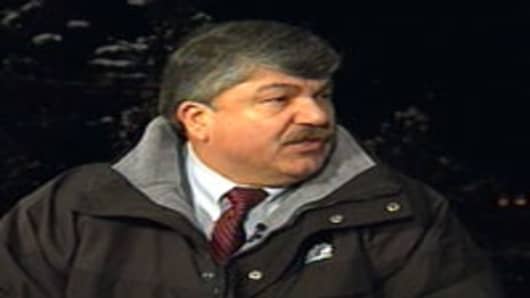President Obama's State of the Union address on Tuesday night highlighted the need for common or shared sacrifice. One of the ways American workers may be asked to sacrifice is, perhaps, to accept cuts in their employer-provided benefits.
"Let's talk about shared sacrifice. Workers have given up their jobs, many have lost their homes, they've lost their pensions and their wages have been cut, all because we had a financial sector that was out of control," Richard Trumka, president of AFL-CIO, the organization that represents 12 million union members, told CNBC on Wednesday.
"For the last twenty years, 56 percent of all income gains have gone to the top 1 percent," Trumka said.
"They still are getting record bonuses. We would love to have shared sacrifice 'cause that would mean we would get a break for a while and they'd have to pay a little bit," he said.
"If we do invest, as the president said, in infrastructure, we can create jobs," Trumka said.
"The only way out of this deficit is not by cutting. You can't cut your way out of it, you got to grow your way out of it. So you create jobs that pay a decent wage," he said.
"Look at the countries that have done the best in this recession—Germany, the nordic countries and Japan—all have extremely high levels of unionization, all have extremely high wages, and a high benefit cost and low unemployment," Trumka said.
But some would argue that unions have benefits that exceed what we can afford in this day and age.
"The question isn't why public workers have a pension, the question is why everybody else doesn't have a pension," he said.
"First of all, you have to have fair taxation, corporations are paying the lowest tax level they've ever had—we want them to pay there fair share, we want shared sacrifice. The rich pay less taxes now then they ever have," Trumka said.
"When Ronald Reagan back in the '70s put this country on a low-wage, high-compensation strategy, they had to start attacking unions. So for thirty years they've been attacking unions, trying to weaken us any way they can," he said.
"Now when you talk to workers, workers are still interested in unions. They still know they need support. They need the voice and strength of a union and quite frankly its the only way we are going to solve this joblessness, because you have to create demand," Trumka said.
"You can't create demand when 72 percent of your economy is driven by consumer spending and those wages are stagnant," he said.
"From '46 to '73, productivity in the country doubled and so did wages—that's when we built the middle class—we had about 38 percent of the members or workers in the country were covered by unions then. So collective bargaining was driving wages for everybody, not just union workers but non-union workers," Trumka said.
"From '73 to date, productivity's continued up but wages have flattened. We're down to about 12.5 percent of the workplace right now, so we don't drive those wages. That's why you're seeing the growing inequality," he said.
Follow Strategy Session on Twitter: @CNBCStrategy
Watch CNBC's "The Strategy Session" weekdays at Noon ET.



